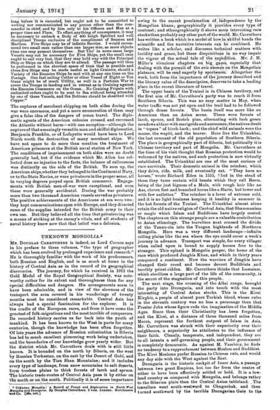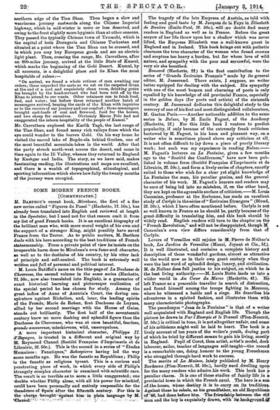UNKNOWN MONGOLIA.;
MIL. DOUGLAS CARRUTHERS is indeed, as Lord Curzon says in his preface to these volumes " the type of geographer which has been evolved by prolonged experience and research?' He is thoroughly familiar with the work of his predecessors, both Russian and English, and is as much at home in the bistory of Central Asia as in the record of its geographical discoveries. The journey, for which he received in 1912 the Gold Medal of the Royal Geographical Society, was note. 'Worthy rather for its extent and thoroughness than for any 'epeeist difficulties and dangers his arrangements seem to lave been admirable, and in view of the slowness of the transport the area covered in his wanderings of twenty months must be considered remarkable. Central Asia has "always had a special fascination for the explorer. It is 'the cradle of the European races, and front it have come the 'greatest of folk.migrations and the most terrible of conquerors. Its recorded history carries us far back into the youth of Mankind. It Ins been known to the West in parts for many centuries, though the knowledge haa been often forgotten. -Of late yearsthe advance of Russian colonization in Siberia has led tonmeh excellent pioneering work being undertaken, and the boundaries of our knowledge grow yearly wider. But the district which Mr. Carruthers deals with is still little known. It is bounded on the north by Siberia, on the west by Russian Turkestan, on the emit by the Desert of Gobi, and on the south by the Than Shan Mountains; and it includes every type of landscape, from snow mountains to salt deports, -from treeless plains to thick forests of Ian* and spruce.
• The'bistorie trade-routes of Central Asia pass it by either on the north or on the south. Politically it is of some importance
• Uninuhns Mongolia & Beard sf Hasa and Exploration at North:West. ..Manieha and Dew pea. By Douglas Carruthers. 2 vet.. Loads,: Hatable.. andCo. Dan sat.]
owing to the recent proclamation of, independeSice by the' Mongolian khans i.geographically it provides every type. bf contrast ; and ethnographically it shows Torii interesting race stocks than probably any other part of the-world. Mr, Carruthers' has written a book which is a model Of how in skilful hands the scientific and the narrative interests can be combined. He writes like a' scholar, and discusses teChnical Matters with lucidity and grace,but these disquisitions in no way impair. the vigour of the .actual tale of the expedition.. -Mr: J. H. Miller's viiacione. cbaplere on' big, geme., especially that: dealing with the purenit of the °via Outten on the fdringoliins' plateaux,' will be read eagerly h5v !sportsmen:- Altogether the work, both from the importance of the journey described arid- the literary value Of the description, deServes to take a leading place in the recent literature of travel.
The upper basin of the Yenisei is in Chinese territory, and the first aim of Mr. Carruthers'e party was to reach it from Southern Siberia. This was no easy 'matter in May. when water traffic was not yet open and the trail had to be followed through dense forests. The basin itself was more like an American than an Asian scene. There were forests of larch, spruce, and Scotch pine, alternating with lush green meadows ablaze with marigolds and anemones; the natives dwelt in" tepees " of birch-hark; and the chief wild animals were the moose, the wapiti, and the beaver. Here Jive the .Uriankhai, the last remnant of the old population- of Southern Siberia. The place is geographically part of Siberia, but politically ibis Chinese territory and part of Mongolia. Mr. Carruthers at the time of his visit thought that Russian. protection would be welcomed by the natives, and such protection is now virtually established. The Uriankhai are one of the most curious of race survivals. Their domestic animal is the reindeer, which they drive, ride, milk, and eventually eat. "They have no horses," wrote Richard Eden in. 3555, .".but in the stead of them they tame certain wild beasts which they call Reem, being of the just bigness of a Mule, with rough hair like an Asa cloven feet and branched horns like a Herta, but lower and with few antlettes." The reindeer is a lover of extreme cold, and it is no light business keeping it healthy in summer in the hot forests of the Yenisei. The Uriankhai almost alone retain the old native religion of Central Asia, that Sham man ism or magic which Islam and Buddhism haee largely ousted_ The chapters on this strange People are a valuable contribution to Asian ethnology. The travellers next creased the divide of the Tannunla into the Turgun highlands of .Northern Mongolia. Here was a very different landscape—infinite rolling plains like the sea where the eye could cover a weeleis journey in advance. Transport was simple, for every villager when called upon is bound to supply horse, free to the stranger. This upland is Mongolia proper, the home of , the race which produced Jengbis Khan, and which in thirty years conquered a. continent. Now the warriors of Jenghis have changed their creed and become devout Buddhists . and terribly priest-ridden. Mr. Carruthers thinks that latmaiam, which sterilizes a large part of the life of the community, is the secret of the stagnation of this people........
The next stage, the crossing of the- Altai range, brought the party into .Dzungaria, and into touch with the moat interesting of Central Asian et-mike. This is the .Kirei Kirghiz, a people of almost pure Turkish blood, whose ruler in the eleventh century was no lees a personage than that Prester John whose figure rode the. imagination of the Middle Ages. Since then their Christianity lam . been forgotten, and the Kirei, at a distance of three thousand miles from Mecca, represent the furthest outpost of Islam in Asia. Mr. Carruthers was struck with their superiority over their neighbours, a superiority he attributes to the • intleeliCe of their faith. Cleanly, temperate, and independent, they are to all intents a self-governing people, and their government is completely democratic. As against M.. Vambery, he finds no tendency toe rapprochement between Moslem and Buddhist. The Ku-el Moslems prefer Resident° Chinese role, and would any day side with the West against the East. Dzungaria is the historic cockpit of Inner Asia, a passage between two great Empires, but too far from the centre of either to have been effectively settled or held. It is, a low- land country as compared with Mongolia, and belongs rather to the Siberian plain than the Ceatiral Asian tableland. , Thp travellers went south-westward to Chuguch.ak, and then turned southward by the terrible Dzungirian Gate to the northern edge of the Tian Shan. Then began a slow and wearisome, journey eadwarde along the Chinese Imperial highway, which in mid-winter is more or leas deserted, and owing to the frost slightly more hygienic than at other seaaons. They passed the typically Chinese town of Urunsobi, which is the capital of both Dzougaria and Chinese Turkestan and situated at a point where the Tian Shan can be crossed, and in which you may buy European goods and see an electric light plant. Then, crossing the range, Mr. Carruthers, after an S00-miles journey, arrived at the little State of Kornai, which marks the beginning of the Gobi Desert. Kumul, by all accounts, is a delightful place and its Khan the moat hospitable of rulers "Os arrival, we found a whole retinue of men awaiting our orders; these unpacked the carts as we set on the carpeted divan at the end of a cool -and exquisitely clean room, drinking green tea brought by the head-servant who had been told off by the Khan to attend to our wants. Other retainers raw to fetch food, fuel, mid water; but lefore these returned another batch of messengers arrived, bearing the cards of the %ban with inquiries as to the success of our journey and our comfort ; these messengers brought cart-loads of coal and firewood, food for the horses, and two cheep for ourselves. Obviously Marco Polo bad not exaggerated the inborn hospitality of the people of KumuL" Mr. Carruthers axplored the Karlik Tagb, the last range of the Tian Shan, and found -many rich valleys from which the eye could wander to the barren Gobi. -On his way home he visited the sacred lake of Bogdo-ola behind Gachen, one of the most beautiful mountain-lakes in the world. After that the party struck north.west across the desert, and came in time again to the Ili Valley, whence they returned to England by Kashger and India. The story, as we have said, makes fascinating reading, the illustrations and amps are excellent, and there is a wealth of topographical, ethnological, and sporting information which shows howlully the twenty months of the journey were occupied.



















































 Previous page
Previous page